Literature

It turned out to provide a useful, if unexpected, education of sorts: for this summer, people are logging the woods behind my family's house, on a piece of conservancy land. The near constant buzzing of the STIHL chainsaws mixes with intermittent cicada sirens in the trees. Each time a tree falls, the booming crash cascades down the hillsides, strangely amplified and muffled at the same time, and practically shaking the ground underfoot for an illusive moment.
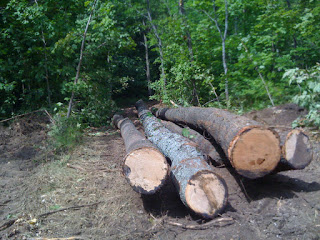
They drag the felled trees through the woods along a fresh path that shows the gouges of the tremendous logs, with surprising glacial rocks and yellow beach sand churned up in the process. What used to be my favorite valley of dense, waist-high bracken ferns is now a staging area where the huge logs are cut into eight-foot lengths.
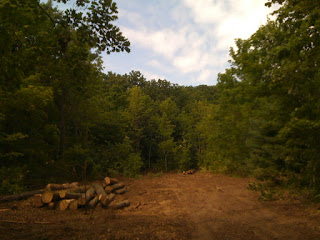
I used to climb these trees. My brother and I would take a compound bow and an old arrow with a lead line attached, and one of us would shoot the arrow up into the highest branches of some giant oak or beech. Then we'd pull a static climbing rope up and over, hooking it into a firm branch fork. With a climbing ascender attached to a harness, and another beneath with webbing for foot loops, we could go vertically straight into the upper canopy of the forest, fifty or sixty feet above. And then...just hang out. There is a whole other life world in the upper story of a deciduous forest. Different birds and bugs, and the way the leaves move around in rustling undulations.
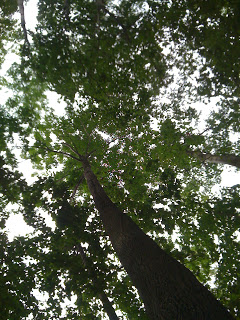
I haven't done that in probably fifteen years, but I can recall the feeling quite vividly. Now I'm seeing some of these very trees lying on the ground, their upper branches?useless because worthless?shattered and scattered around. Tangles of discarded biomass left behind in the wake of the destruction. It's sad, and more than a little depressing.
But I'm not simply waxing nostalgic. I'm actually attempting to be enchanted by the spectacle and the tremendous effort that goes into logging a forest, visibly imprinted as it is in the incredible tire tracks made by the Timberjack skidders.
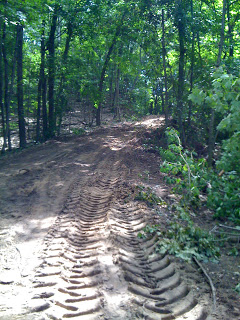
This is hardly clear-cut logging. What's happening back here is selective?one might even say 'sustainable'?logging. (We need to bracket that word 'sustainable', though, as it begs uncomfortable questions concerning for how long, and for whom or what purpose.)
The logging happening here is fairly targeted, thinning out the white ash and northern red oak trees and thus making room for new growth?the millions of seedlings and saplings sprouting up from the floor below, but which struggle to get light when the canopy is too dense. You wouldn't believe how dark it can be in the middle of the day in the thickest parts of the woods. Now, after the loggers have moved through an area, there are bright splotches of sunlight on the forest floor, jagged puzzle pieces flickering on the undergrowth.
I'll admit that there is a latent part of me that drifts toward the mindset of Edward Abbey's seminal study of eco-terrorism, The Monkey Wrench Gang: I sort of want to sabotage the whole operation. Yet I'm restraining myself, and instead just spying on the outfit from afar, perched on an adjacent ridge. Here in the distance you can glimpse one of the skidders, an orange one, crashing through the trees:
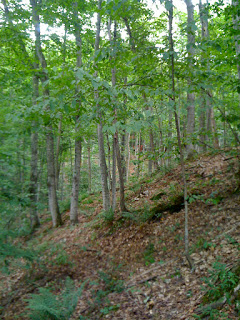
In the canon of wilderness writing there's also the poetry of Gary Snyder to entertain?especially pertinent to this post, the section "Logging" from Myths & Texts. Here, Snyder dutifully lists the various goings on around an active logging camp:
When Snyder notices that "mashed bushes make strange smells" it's as if the bushes are making the smells not just for the humans, but for the very strangeness of the smells themselves. I've felt this in the forest over the past few weeks: the smell of the cut trees is so pungent that it jerks me out of my own nose?I feel thrust into the underbrush, into an alien world. Likewise, in Snyder's evocation of the brittleness of the lodgepoles and the watching of the camprobbers (or gray jays), these things happen on their own trajectories, intersecting with the logging operation but also entirely of their own being. Snyder's lines might at first sound sad about the shorn forest, but the more you read of this poem, the more other entities emerge and rise up to an equal status alongside the loggers?even in the midst of the apparently human-caused turmoil.
As hard as it is to watch, and as destructive as it seems, this logging is good for the forest?in the sense that it spurs regeneration and new growth. The other day when I told a biologist friend of mine about the logging, he said, "It would really be great if they burned it all down to the ground back there?then you'd really see some exciting species return to the area!" He's of course right. Forests thrive on dramatic upheavals and wholesale razing. It often happens on longer timescales than we can imagine or come to terms with, but to quote Sontag once again, "Camp is the attempt to do something extraordinary." The logging camp?and the forest at large, a domain without bounds, commingling with tractors and chainsaws?is indeed an attempt at something extraordinary.
- Newspaper Article For Brother Man
Assignment: Pretend you witnessed the beating of Brother Man. Write a letter to the editor of a newspaper in your country and express your feelings about the attack and your feelings on Rastafarianism on a hold. ...
- The Kettle Pond
the kettle pond A few years ago I took a walk in a huge swath of forest that is officially part of the National Lakeshore, but which is weirdly cut off from the rest of the park, in the middle of Leelanau County. That time, I got lost. A friend and...
- Reflecting On & Experimenting With "prismatic Ecologies"
At the recent conference for the Association for the Study of Literature and the Environment (ASLE), I dared my rental car company by lingering in Lawrence, Kansas for an extra couple hours, squeezing out some additional time so that I could go to a panel...
- Summary Of The Trees By Philip Larkin
Philip Larkin (1922-1985) is a poet whose work is very popular, despite his reputation for being a pessimistic, death-obsessed and darkly humorous observer of humanity. In this poem, Larkin...
- Summary Of The Trees Are Down By Charlotte Mew
Charlotte Mew (1869 - 1927) was highly regarded by writers such as Thomas Hardy. She vowed never to marry because she feared she might carry hereditary mental illness, as a brother and sister committed to institutions. This fear, and grief...
Literature
Logging Camp
I am strongly drawn to Camp, and almost as strongly offended by it. That is why I want to talk about it, and why I can.
?Susan Sontag, "Notes on Camp"
Last spring I enjoyed reading Richard Scarry's classic book Cars and Trucks and Things That Go to my small roommate Julien. It's basically an introduction to Object-Oriented Ontology: it turns out that pretty much everything goes, and has a perspective?even nonliving things. One page that kept catching Julien's fascination was the page where the pig family (the road-tripping main characters of the story) passes a logging camp.
It turned out to provide a useful, if unexpected, education of sorts: for this summer, people are logging the woods behind my family's house, on a piece of conservancy land. The near constant buzzing of the STIHL chainsaws mixes with intermittent cicada sirens in the trees. Each time a tree falls, the booming crash cascades down the hillsides, strangely amplified and muffled at the same time, and practically shaking the ground underfoot for an illusive moment.
I used to climb these trees. My brother and I would take a compound bow and an old arrow with a lead line attached, and one of us would shoot the arrow up into the highest branches of some giant oak or beech. Then we'd pull a static climbing rope up and over, hooking it into a firm branch fork. With a climbing ascender attached to a harness, and another beneath with webbing for foot loops, we could go vertically straight into the upper canopy of the forest, fifty or sixty feet above. And then...just hang out. There is a whole other life world in the upper story of a deciduous forest. Different birds and bugs, and the way the leaves move around in rustling undulations.
I haven't done that in probably fifteen years, but I can recall the feeling quite vividly. Now I'm seeing some of these very trees lying on the ground, their upper branches?useless because worthless?shattered and scattered around. Tangles of discarded biomass left behind in the wake of the destruction. It's sad, and more than a little depressing.
But I'm not simply waxing nostalgic. I'm actually attempting to be enchanted by the spectacle and the tremendous effort that goes into logging a forest, visibly imprinted as it is in the incredible tire tracks made by the Timberjack skidders.

This is hardly clear-cut logging. What's happening back here is selective?one might even say 'sustainable'?logging. (We need to bracket that word 'sustainable', though, as it begs uncomfortable questions concerning for how long, and for whom or what purpose.)
The logging happening here is fairly targeted, thinning out the white ash and northern red oak trees and thus making room for new growth?the millions of seedlings and saplings sprouting up from the floor below, but which struggle to get light when the canopy is too dense. You wouldn't believe how dark it can be in the middle of the day in the thickest parts of the woods. Now, after the loggers have moved through an area, there are bright splotches of sunlight on the forest floor, jagged puzzle pieces flickering on the undergrowth.
I'll admit that there is a latent part of me that drifts toward the mindset of Edward Abbey's seminal study of eco-terrorism, The Monkey Wrench Gang: I sort of want to sabotage the whole operation. Yet I'm restraining myself, and instead just spying on the outfit from afar, perched on an adjacent ridge. Here in the distance you can glimpse one of the skidders, an orange one, crashing through the trees:

In the canon of wilderness writing there's also the poetry of Gary Snyder to entertain?especially pertinent to this post, the section "Logging" from Myths & Texts. Here, Snyder dutifully lists the various goings on around an active logging camp:
The D8 tears through piss-fir,Each line has multiple objects interacting, violently or just barely, or passing by one another oblivious...and the human becomes one thing among many in this scene. It's not just a logging camp; it's kind of campy, too, in the sense that Susan Sontag might have described it. For Sontag, "an important element of the Camp sensibility [is] the equivalence of all objects...."
Scrapes the seed-pine
chipmunks flee,
A black ant carries an egg
Aimlessly from the battered ground.
Yellowjackets swarm and circle
Above the crushed dead log, their home.
Pitch oozes from barked
trees still standing,
Mashed bushes make strange smells.
Lodgepole pines are brittle.
Camprobbers flutter to watch.
When Snyder notices that "mashed bushes make strange smells" it's as if the bushes are making the smells not just for the humans, but for the very strangeness of the smells themselves. I've felt this in the forest over the past few weeks: the smell of the cut trees is so pungent that it jerks me out of my own nose?I feel thrust into the underbrush, into an alien world. Likewise, in Snyder's evocation of the brittleness of the lodgepoles and the watching of the camprobbers (or gray jays), these things happen on their own trajectories, intersecting with the logging operation but also entirely of their own being. Snyder's lines might at first sound sad about the shorn forest, but the more you read of this poem, the more other entities emerge and rise up to an equal status alongside the loggers?even in the midst of the apparently human-caused turmoil.
As hard as it is to watch, and as destructive as it seems, this logging is good for the forest?in the sense that it spurs regeneration and new growth. The other day when I told a biologist friend of mine about the logging, he said, "It would really be great if they burned it all down to the ground back there?then you'd really see some exciting species return to the area!" He's of course right. Forests thrive on dramatic upheavals and wholesale razing. It often happens on longer timescales than we can imagine or come to terms with, but to quote Sontag once again, "Camp is the attempt to do something extraordinary." The logging camp?and the forest at large, a domain without bounds, commingling with tractors and chainsaws?is indeed an attempt at something extraordinary.
- Newspaper Article For Brother Man
Assignment: Pretend you witnessed the beating of Brother Man. Write a letter to the editor of a newspaper in your country and express your feelings about the attack and your feelings on Rastafarianism on a hold. ...
- The Kettle Pond
the kettle pond A few years ago I took a walk in a huge swath of forest that is officially part of the National Lakeshore, but which is weirdly cut off from the rest of the park, in the middle of Leelanau County. That time, I got lost. A friend and...
- Reflecting On & Experimenting With "prismatic Ecologies"
At the recent conference for the Association for the Study of Literature and the Environment (ASLE), I dared my rental car company by lingering in Lawrence, Kansas for an extra couple hours, squeezing out some additional time so that I could go to a panel...
- Summary Of The Trees By Philip Larkin
Philip Larkin (1922-1985) is a poet whose work is very popular, despite his reputation for being a pessimistic, death-obsessed and darkly humorous observer of humanity. In this poem, Larkin...
- Summary Of The Trees Are Down By Charlotte Mew
Charlotte Mew (1869 - 1927) was highly regarded by writers such as Thomas Hardy. She vowed never to marry because she feared she might carry hereditary mental illness, as a brother and sister committed to institutions. This fear, and grief...
